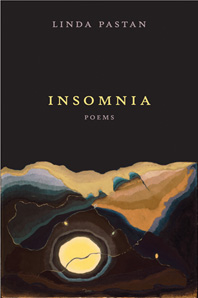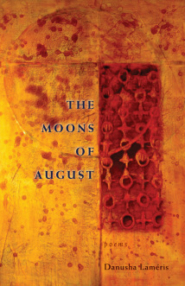It is National Poetry Month, and having gone through all of my books in March (and letting go of a great number of them), I thought I would read an entire poetry book each day in April, and then tell you about it.
A few years ago, when AWP was in Seattle, I attended a presentation featuring readers from The Sun, and that is how Danusha Laméris hit my radar. As soon as I got home, I looked her up and ordered her book. The Moons of August, I learned, once it was in my hands, was selected by Naomi Shihab Nye for the 2013 Autumn House Press Poetry Prize. When I read the list of acknowledgments in the back (Ellen Bass, Dorianne Laux, Joseph Millar), I knew that I was surely destined to find her.
Laméris writes poems that so delight me, poems I have read over and over again. A few of her poems overlap with my own themes (for instance, “Fictional Characters,” which begins, “Do they ever want to escape? / Climb out of the white pages / and enter our world?”), but more often poems that I simply wish to goodness I had written. I write her poems into my own notebook, and see if I can imitate them, determined to write something that will please me half as much.
The Moons of August is like a series of hallways and stairwells that take you deeper and deeper into a house. You turn a corner and find a picture of her late brother, or her lost infant. Sometimes, you find hieroglyphics or cave drawings on the walls. There’s the funny story about her mother measuring penises, that turns into a reflection about God counting the hairs on our heads. We see people walking ahead of us, catch only a glimpse of Jack Gilbert or Temple Grandin as they disappear into a basement or climb out a window. Humor and heartbreak and a wry, forgiving and encompassing compassion are threaded all the way through.
I was thinking of the difficulty of picking just one poem to share with you, and then, I reread this poem. In it, Laméris displays that wonderful Ted-Kooser-like ability to take an ordinary moment in a woman’s life and turn it into something extraordinary.
Cherries
The woman standing in the Whole Foods aisle
over the pyramid of fruit, neatly arranged
under glossy lights, watched me drop
a handful into a paper bag, said how do you do it?
I always have to check each one.
I looked down at the dark red fruit, each cherry
good in its own, particular way
the way breasts are good or birds or stars.
Doesn’t everything that shines carry its own shadow?
A scar across the surface, a worm buried in the sweet flesh.
Why not reach in, take whatever falls into your hand.
Danusha Laméris: The Moons of August (Autumn House Press 2014)





 This morning I reread the poems in Love Is Not Enough by Irish academic and poet
This morning I reread the poems in Love Is Not Enough by Irish academic and poet 


